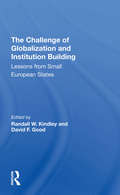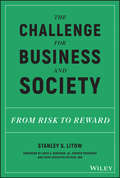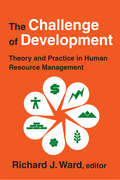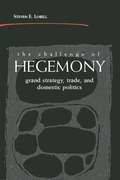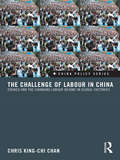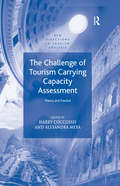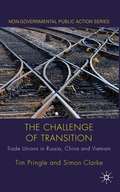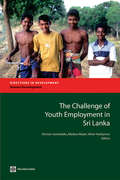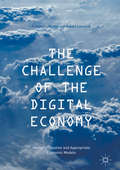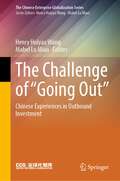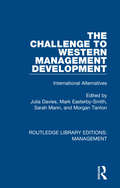- Table View
- List View
The Challenge Facing the U.S. Healthcare Delivery System
by Carin-Isabel Knoop Richard BohmerDiscusses the challenges currently facing the U.S. health care delivery system. These challenges frame the problems managers of delivery organizations are currently facing. They include a burgeoning gap between demand and supply. Demand for health care services is increasing as the population ages, chronic diseases become more common, and medical technology increases. Yet, the supply of nurses and physicians is decreasing. Moreover, as both regulators and the general public become more interested in the quality of care delivered, there is evidence of substantial quality failures. In response to these challenges, regulators have introduced new forms of payment and financial incentives for doctors and delivery organizations, and managers have experimented with several new service models and delivery organization designs. They include the use of new professionals and other assistive personnel, such as nurse practitioners and physicians' assistants, in-store clinics, focused factories and concierge care.
The Challenge For Japanese Multinationals
by Hiroo TakahashiThe Challenge for Japanese Multinationals is about strategic issues of modern management from the view of global business practice. In the 2010 issue of Fortune Magazine's top 500 Multi-National Corporations, the USA ranked number one with 139 companies. This was followed with 71 companies in Japan and 149 in the EU. With the maturing of the domestic market, Japanese MNCs - not only in manufacturing industries but in non-manufacturing industries as well, will continue to globalize, with overseas expansion accelerating in emerging countries such as BRICs.
The Challenge Of Globalization And Institution Building: Lessons From Small European States
by Randall W. Kindley David F GoodDescribing and analyzing the links between monetary policy and economic governance in small countries in both Western and Eastern Europe, this interdisciplinary volume demonstrates how interest groups shape monetary policy decisions in increasingly globalized financial markets. The contributors' findings hold great relevance even for large contries like the United States, which are now struggling with the challenges of internationalization. A diverse group of political scientists and economists, the contributors contend that although the small states have limited options, they are nonetheless able to make choices that enable their export industries to flourish in an environment of increasing internationalization. The authors conclude that lack of control over the future shape of monetary union in Europe is not inimical to future prosperity.
The Challenge for Business and Society: From Risk to Reward
by Stanley S. LitowA roadmap to improve corporate social responsibility The 2016 U.S. Presidential Campaign focused a good deal of attention on the role of corporations in society, from both sides of the aisle. In the lead up to the election, big companies were accused of profiteering, plundering the environment, and ignoring (even exacerbating) societal ills ranging from illiteracy and discrimination to obesity and opioid addiction. Income inequality was laid squarely at the feet of us companies. The Trump administration then moved swiftly to scrap fiscal, social, and environmental rules that purportedly hobble business, to redirect or shut down cabinet offices historically protecting the public good, and to roll back clean power, consumer protection, living wage, healthy eating initiatives and even basic public funding for public schools. To many eyes, and the lens of history, this may usher in a new era of cowboy capitalism with big companies, unfettered by regulation and encouraged by the presidential bully pulpit, free to go about the business of making money—no matter the consequences to consumers and the commonwealth. While this may please some companies in the short term, the long term consequences might result in just the opposite. And while the new administration promises to reduce "foreign aid" and the social safety net, Stanley S. Litow believes big companies will be motivated to step up their efforts to create jobs, reduce poverty, improve education and health, and address climate change issues — both domestically and around the world. For some leaders in the private sector this is not a matter of public relations or charity. It is integral to their corporate strategy—resulting in creating new markets, reducing risks, attracting and retaining top talent, and generating growth and realizing opportunities. Through case studies (many of which the author spearheaded at IBM), The Challenge for Business and Society provides clear guidance for companies to build their own corporate sustainability and social responsibility plans positively effecting their bottom lines producing real return on their investments. This book will help: • Create an effective corporate social responsibility and sustainability plan • Provide long-term bottom line benefit • Protect and enrich brand value• Recruit and retain top talent Perfect for CEOs, CFOs, Human Resource/Corporate Affairs executives, but also for government and not-for-profit leaders, this book helps you come up with a solid plan for giving back to society, producing real sustainable value.
The Challenge for Energy Justice: Correcting Human Rights Abuses
by Raphael J HeffronWritten by one of the world’s leading scholars in the field, this book provides a unique perspective on the connections between energy justice and human rights. Taking an interdisciplinary approach, the author offers an accessible discussion about the implementation of energy justice in practice. The book explores the rise of justice issues in the energy sector, the interdisciplinary nature of energy justice, the economics of energy justice and provides a practical case study on distributive justice. The penultimate chapter focuses on human rights and energy justice in a world first, and explores the topic from the perspective of the opportunity of last resort. This ‘opportunity of last resort’ is the national courts and is the place where societies can seek to have justice enforced through a variety of human rights being protected. Finally, energy justice risks are highlighted alongside the author’s proposed framework for the next generation of energy justice scholars.
The Challenge for Japanese Multinationals
by Hiroo TakahashiThe Challenge for Japanese Multinationals is about strategic issues of modern management from the view of global business practice. In the 2010 issue of Fortune Magazine's top 500 Multi-National Corporations, the USA ranked number one with 139 companies. This was followed with 71 companies in Japan and 149 in the EU. With the maturing of the domestic market, Japanese MNCs - not only in manufacturing industries but in non-manufacturing industries as well, will continue to globalize, with overseas expansion accelerating in emerging countries such as BRICs.
The Challenge of African Economic Recovery and Development
by Adebayo Adedeji Owodunni Teriba Patrick BugembeA special session of the UN General Assembly was held in Abuja, the new Nigerian capital in May 1988. This volume reproduces the major papers, lines of discussion and conclusions of the conference.
The Challenge of Child Labour in International Law
by Franziska HumbertChild labour remains a widespread problem around the world. Over 200 million children can be regarded as child labourers, and about 10 million children are involved in producing either agricultural or manufactured products for export. Franziska Humbert explores the status of child labour in international law. Offering a wide-ranging analysis of the problem, she explores the various UN and ILO instruments and reveals the weaknesses of the current frameworks installed by these bodies to protect children from economic exploitation. After assessing to what extent trade measures such as conditionalities, labelling and trade restrictions and promotional activities can reduce child labour, she suggests an alternative legal framework which takes into account the needs of children.
The Challenge of Development: Theory and Practice in Human Resource Management (Critical Global Citizenship Education Ser.)
by AntonioA wide-ranging survey of the theoretical and practical problems of economic development, The Challenge of Development demonstrates how effective development theory, planning and programming derive from and are tested in firsthand field experience. Covering all aspects of development, Richard J. Ward presents chapters by leading authorities who have combined academic teaching and research with years of effort in underdeveloped countries or in the administration of foreign aid programs.The materials in The Challenge of Development are divided into six sections, providing logical, coherent coverage of each major segment of development programs: methodology, strategy and decision-making criteria in development; manpower needs and projections; the intrinsic value of land, including its agricultural potential; promoting the industrial sector; the development of infrastructure power, transportation and communications; and the social problems created by modern growth trends. In this way, it provides a balanced, practical approach to studying development problems and to working successfully in development programs.Encompassing a broad spectrum of material and illustrating the need for an interdisciplinary approach to the problems of development, The Challenge of Development is essential reading for all students of development at every level, is a useful sourcebook for the practitioner's library and an excellent handbook for business and political officials concerned with development.
The Challenge of Doing the Right Thing Poorly: Courage and Vulnerability--Your Path to Greater Success and Satisfaction
by Thomas J. DelongIt's a paradox: many highly successful people tend to become reluctant to move beyond their already proven capabilities. Behind this inertia is a deeply rooted anxiety: you want to continually perform at peak level, to be recognized, and to have strong relationships with your boss and your colleagues. To overcome this anxiety and keep growing, says organizational behavior expert Tom DeLong, you must allow yourself to do the right thing poorly. Like a golfer adopting a better but unfamiliar swing, you must summon the courage to move into new territory and allow yourself to make mistakes in order to grow. Using vivid personal stories and penetrating diagnostic questions, DeLong shows how you can break out of the mind-set that keeps high-need-for-achievement professionals like you from reaching their full potential. This chapter was originally published as Chapter 2 of "Flying Without a Net: Turn Fear of Change into Fuel for Success."
The Challenge of Enforcement in Securities Markets: Mission Impossible?
by Jennifer Elliott Ana CarvajalA report from the International Monetary Fund.
The Challenge of Hegemony: Grand Strategy, Trade, and Domestic Politics
by Steven E. LobellThe Challenge of Hegemony explains how international forces subtly influence foreign, economic, and security policies of declining world powers. Using detail-rich case studies, this sweeping study integrates domestic and systemic policy to explain these countries' grand strategies. The book concludes with a discussion of the implications for the future of American foreign policy. "His conceptually rigorous and tightly reasoned study . . . reminds us that power is never value neutral but organizes commercial systems in liberal or imperial terms. " ---Perspectives on Politics "Lobell's book is tightly written, nicely argued and thoroughly researched to a fault. He seems to delight in historical detail. The complexity of his approach is refreshing. " ---International Affairs "The Challenge of Hegemony is a pleasure to read. It is both theoretically sophisticated and empirically rich. " ---International Studies Review "The Challenge of Hegemony offers a compelling reinterpretation of key historical cases and provides wise guidance as to how the United States should wield its power today. " --Charles A. Kupchan, Council on Foreign Relations "Lobell demonstrates clearly how the international environment confronting great powers interacts with their domestic political coalitions to produce different grand strategies. Through a masterful sweep of history, Lobell shows us the alternative trajectories before the United States today. " --David A. Lake, University of California, San Diego
The Challenge of Interior Design: Professional Value and Opportunities
by Mary V. KnackstedtKnackstedt, an interior designer and business consultant, takes an eye to changes happening in the interior design field and advises readers how to confront the challenges they entail. The book discusses what is different in the following design-related areas: business theories and today's market, industry, trends, clients' needs, design firms, learning programs, communication, the design team, and specialization.
The Challenge of Labour in China: Strikes and the Changing Labour Regime in Global Factories (China Policy Series)
by Chris King-chi ChanChina’s economic success has been founded partly on relatively cheap labour, especially in the export industries. In recent years, however, there has been growing concern about wages and labour standards in China. This book examines how wages are bargained, fought over and determined in China, by exploring how the pattern of labour conflict has changed over time since the 1970s. It focuses in particular on the city of Shenzhen where labour conflict and workers’ protests have been especially prevalent. This book includes a detailed account of the transformation of labour relations and labour policy in China more broadly during 2004 to 2009, a period when there have been significant changes in the labour market, labour regulation and labour relations. The author argues that these recent developments have brought to the fore the class basis of workers’ protest in China and have thoroughly undermined the post-Marxist analysis of identity politics. The book makes an invaluable contribution to studies on industry and labour, as well as Chinese studies.
The Challenge of Labour: Shaping British Society, 1850–1930 (Routledge Revivals)
by Keith BurgessThe Challenge of Labour (1980) explains the changing forms of labour’s relationship with British society during the period of 1850 to 1930 – as the economic and social relations of Britain, the pioneer of modern industrial development, were undergoing a profound transformation due to increasing pressure from foreign competitors. It looks at the importance of the forces of production in determining the character of the relationship, whilst regarding labour as a creative act, identifying man as a social animal. This important period gave rise to a unique symbiosis in terms of a mutually dependent but simultaneously antagonistic relationship, reflected in the growth of trade unionism, associations for working class ‘self-help’, and labourist political movements during the years 1850–70. The book goes on to explain why and how these forms of labour’s relationship with British society as a whole were subsequently to be transformed as they were affected by the changing direction of Britain’s economic development after the 1870s. This resulted in a recognisable ‘modern’ pattern of British social relations, marked by a growing acceptance of ‘corporatist’ solutions to problems of economic and social instability.
The Challenge of Predicting Economic Crises
by Andrew Berg Catherine PattilloA report from the International Monetary Fund.
The Challenge of Public Pension Reform in Advanced and Emerging Market Economies
by Sanjeev Gupta Benedict Clements David Coady Alvar Kangur Frank Eich Baoping Shang Mauricio SotoA report from the International Monetary Fund.
The Challenge of Tourism Carrying Capacity Assessment: Theory and Practice (New Directions in Tourism Analysis)
by Harry Coccossis Alexandra MexaPlanning and management for tourism growth is becoming essential in the context of sustainable development. Particularly so since many tourist destinations are facing severe pressures from tourist flows and activities. Such pressures are evidenced in terms of dysfunctions (congestion, environmental degradation, etc) which ultimately affect the attraction and competitiveness of tourism destinations. The development of tourism should be considered in accordance with sustainability principles. In this context respecting the capacity of the local system to sustain growth becomes a key challenge. This book examines the use of various tools to define, measure and evaluate tourism carrying capacity (TCC) - a tool aiming to impose limits for entering certain tourist destinations or using certain activities. Drawing on case studies from France, Spain, Italy, Greece, the UK, the Netherlands, Ireland, Belgium, Austria, Germany and Finland, it presents practical experiences of implementing TCC in various tourist destinations (i.e. historic towns, coastal zones, islands, etc). It draws conclusions regarding the measurement and implementation of TCC assessment and provides further guidelines towards a comprehensive methodological framework for assessing tourism sustainability in the future.
The Challenge of Transition: Trade Unions in Russia, China and Vietnam
by Simon Clarke Tim PringleThis book explores the transformation of employment relations, the rise of worker protest and the reform of trade union practice to ask how successfully the state-socialist trade unions have adapted to their new role of representing the rights and interests of workers.
The Challenge of Working for Americans
by Bond BentonThe global focus of corporations, government institutions, and NGOs have led to a defining question of the era: How do foreigners feel about working for Americans? Through surveys with over 700 Foreign Service nationals working within the US State Department, Benton examines perceptions of non-Americans working in overtly American environments.
The Challenge of Youth Employment in Sri Lanka
by Ramani Gunatlilaka Milan Vodopivec Markus MayerSri Lanka has long been regarded as a model of a successful welfare state in a low-income setting, yet it has not succeeded in creating a sufficient number of "good jobs" for the increasing number of young people. Hence, young Sri Lankans perceive their country as an unjust and unequal society, in which mainstream institutions have failed to address inequalities in the distribution of resources, as well as of benefits deriving from economic growth. Against this background, 'The Challenge of Youth Employment in Sri Lanka' aims to identify ways to improve the opportunities available to new job market entrants by addressing existing inequalities and to help young people more fully realize their potentials. Drawing from original research and a review of existing studies, the authors use the "4Es" conceptual framework to analyze four key aspects of labor markets-employment creation, employability, entrepreneurship, and equal opportunity-identifying main issues and results, current trends, and possible new approaches.
The Challenge of the Digital Economy
by Robert Leonardi Francesco BocciaThis volume presents contributions that analyse the extraordinary impact of digital technology on business, services, and the production of value in many sectors of the economy. At the heart of this book is the fact that the entire digital economy is now worth almost 6% of global GDP, and it continues to grow at an unprecedented rate. The volume covers the general debate on taxation and the digital economy with the chapters by Russo, Makiyama and Boccia, before completing the analysis with discussion of three national case studies covering the U. S. (Pagano), U. K. (Leonardi) and Italy (Boccia and Leonardi). Contributors are leading experts in the fields of taxation and the digital economy and contextualise the key issues surrounding the digitalisation of the economy from an international perspective.
The Challenge of “Going Out”: Chinese Experiences in Outbound Investment (The Chinese Enterprise Globalization Series)
by Henry Huiyao Wang Mabel Lu MiaoIn an attempt to make sense of the complex process of adaptation that Chinese enterprises must go through in the course of “going out”, this book provides a multidimensional analysis of the driving forces, legal and systemic hurdles, as well as the risks and opportunities that Chinese enterprises must consider as they seek greater fortunes beyond their own borders. Comprehensive surveys conducted on a range of enterprises provide the foundation for an overview of the current state of Chinese companies operating overseas and developing trends in their overseas investment. Specific topics include key challenges that companies face, their strategies and ultimate goals, as well as their practical experience in investing abroad, especially in Belt and Road countries. Also included are the insightful views of experts, scholars and entrepreneurs with a wealth of experience in transnational investment in areas related to the globalization of Chinese enterprises, including regional investment risk, overseas talent strategies, legal and compliance issues, and even the role of technology and the Internet in cross-border e-commerce, just to name a few. It is our hope that this book will help readers better understand the current state of Chinese enterprises expanding globally, but even more importantly, we hope to provide valuable information for individual enterprises looking to “go out”, helping them clarify their investment strategies, make the most of opportunities, manage challenges and take their business to the next level.
The Challenge to Change: Reforming Health Care on the Front Line in the United States and the United Kingdom
by Rebecca Kolins GivanThere is constant pressure on hospitals to improve health care delivery and increase cost effectiveness. New initiatives are the order of the day in the dramatically different health care systems of the United States and Great Britain. Often, as we know all too well, these efforts are not successful. In The Challenge to Change, Rebecca Kolins Givan analyzes the successes and failures of efforts to improve hospitals and explains what factors make it likely that the implementation of reforms will be rewarded by positive transformation in a particular institution's day-to-day operation. Givan's in-depth qualitative case studies of both top-down initiatives and changes first suggested by staff on the front lines of care point clearly to the importance of all hospital workers in effecting change and even influencing national policy.Givan illuminates the critical role of workers, managers, and unions in enabling or constraining changes in policies and procedures and ensuring their implementation. Givan spotlights an Anglo-American model of hospital care and work organization, even while these countries retain their differences in access and payment. Entrenched professional roles, hierarchical workplace organization, and the sometimes-detached view of policymakers all shape the prospects for change in hospitals. Givan provides important examples of how the dedication and imagination of the people who work in hospitals can make all the difference when it comes to providing quality health care even in a challenging economic environment.
The Challenge to Western Management Development: International Alternatives (Routledge Library Editions: Management #23)
by Mark Easterby-Smith Julia Davies Sarah Mann Morgan TantonOriginally published in 1989. Given the increasing amount of economic competition at a global level, the quality and provision of management education is coming under very close scrutiny in a large number of countries, both in developing countries where management is relatively new, and in developed countries where it is more established. This book aims to enable debates within any one country to be placed within a wider context. It is based on eighteen contributions from experts in countries around the world who review the state of management education and the problems and priorities that are currently faced. Anyone concerned about the future of management education in any one country – whether they be policy makers or workers within the system – will find this book of particular value. It will also be extremely useful for the discerning clients of management development not because it gives a guide to individual institutions or courses, but because it contextualises many of the key issues and choices involved in the provision and use of management education.


